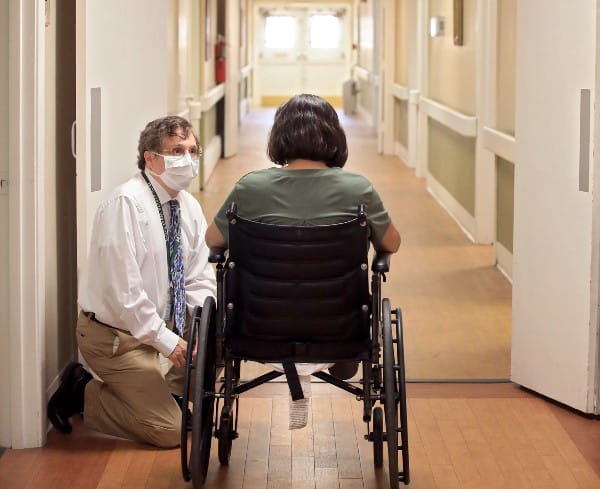Michael Murphy — the type of guy who runs into a fire even during a pandemic

Meet Our Residents and Team Members
Michael Murphy's story
Michael Murphy was hired to be an administrative assistant at Sanders Retirement Village, but the Navy veteran isn’t the kind of guy to stick to the words of a job description when he sees something needs to be done.
The Yorktown resident was a new team member in March 2020, a time when the COVID-19 pandemic wasn’t just something in the news. It was affecting hundreds of thousands of people daily, many of them in Virginia, with growing numbers in Hampton Roads and on the Middle Peninsula.
Places where large numbers of senior citizens resided were at the most risk.
The Riverside retirement community in Gloucester on Main Street prioritized safety — a dizzying practice that called for evolving protocols and measures to keep residents safe.
In the midst of it all was the newbie, Murphy, who watched those around him transition into unfamiliar roles. He joined them without giving it a second thought.
“I’m not the guy who runs away from the fire; I’m the guy who runs into the fire,” Murphy says. “I’m not the type to back away from a battle. If something needs to be done, let’s get it done. I was watching the staff deal with process and procedures they had never dealt with before and that stressed everybody out. There was no room for error. Everything was more heightened.”
On one hand, he’s a number cruncher, whose analytical mind easily adapted to taking over many of the duties of the business office manager who had to go out on leave. Another part of him loves people. As a youth minister, he most enjoyed mentoring marginalized teenagers struggling to find their purpose in life. When Sanders needed someone to fill in for the departed chaplain, Murphy was willing, even though he had never felt at ease with an older population.
“it was a challenge,” he admits, but he learned age didn’t affect behavior all that much. Many of the traits he saw in teens, he also saw in older adults. “The knowledge that there’s a person in need regardless of whether I’m comfortable with them made a difference,” he says.
He understood that communication was never more vital. Family members would come to the door in tears, fearful of being able to see their mother, father, sister or brother due to the restrictions in place. Murphy was never too busy to talk with them.
“From being a chaplain, I’ve learned to identify where people are by watching their facial expressions and reading their body language,” he says. “Sometimes they needed someone to come alongside and take the time to listen. I had the time to listen. Sometimes you would see staff come in the door and you could just look in their eyes and see they had just worked a double. Or they were struggling at home.”
“Sit down. Let’s have a conversation,” Murphy would suggest.
“One of the things I do is watch what everybody else does and figure out how I can help,” he says. “I found stuff I could take off everyone else’s plate so they could do the big stuff more effectively.”
Those early months of the pandemic required a patience most of us aren’t used to having. “This isn’t something that was a couple of weeks. This went on for months and months that people couldn’t see who they cared about,” Murphy says. “Families weren’t processing that well. They had to trust us. It was really hard.”
Murphy brought perspective, reminding people on some of their darkest hours, “This isn’t forever.” As trying as the frustration of separating people during such an emotional period was, it helped that not a single case of COVID-19 was recorded at Sanders.
At the same time Murphy was helping others overcome their fear, he faced his own concerns.
In November 2020, his father died due to COVID-19. Gary Murphy, 77, had throat cancer but following chemotherapy treatments was entering remission when he got hit with the virus in the Cleveland Clinic.
“I had been flying back and forth to see him on empty planes,” Murphy says. “I was processing the same stuff that the families were going through. There was definitely some empathy there that I was able to get my head around. Grief is a tricky little devil. It will sneak up and punch you in the gut when you don’t see it coming.”
Sometimes he had to take a moment for himself when something would trigger his sadness, but it was always just that. One moment. Then he returned, offering comfort, answering questions, finding out what needed to be done. next
Today, promoted to business office manager, Murphy is in the middle of another transitional period at Sanders — helping families and residents adjust to relaxed restrictions and portions of life that are normal again. It’s not so easy, for example, to discard a mask after wearing one nonstop for a year-plus.
“That’s seems to be creating a certain amount of stress, also,” he says. “We can let families in now. Things are lifting and changing incrementally. The things that were burdensome are now things we have a hard time letting go of.”
Murphy remains flexible and nimble to put the needs of others before his own. The only thing he can’t seem to handle is not working at all. He had planned to semi-retire and play golf before he took the job at Sanders. But he’s not really good at puttering around the house.
“So, I got the job here,” he says. “I didn’t really think I’d ever be doing this kind of stuff, but I wanted to stay busy and there was a need. And when there’s a hole, I try my best to fill it.”